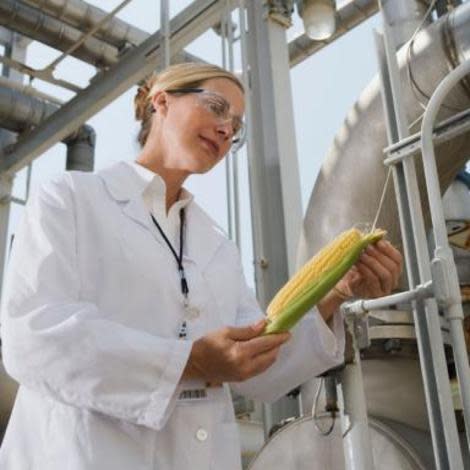Are GMO Food Risks Overblown?
by Mike Roussell, SHAPE Diet Doctor, ph.D., for SHAPE.com

The topic of genetically modified foods is one that is hotly debated, but the problem is that the phrase GMO is very broad and encompasses techniques and modifications to food that you potentially should and shouldn't be concerned about. At this point in time there doesn't seem to be an overt benefit or risk to consuming GMO foods, but let's explore a little further.
What Are the Major GMO Foods?
According to the FDA, the big three GMO foods are soybeans, corn, and canola. But the FDA has also evaluated the safety of genetic modifications to flax, tomatoes, potatoes, cantaloupe, alfalfa, creeping bentgrass, papaya, sugar beets, wheat, squash, radicchio, and plums. The FDA lists consultations on GMO foods and what was genetically modified in the food to warrant the safety consultation on its website.
RELATED: 7 Foods a Nutritionist Would Never Eat
Benefits of GMO Foods
In the mid- to late 1800s, monk Gregor Mendel, the "father of modern genetics," discovered that you could selectively breed pea plants to elicit specific traits in subsequent crops. This was essentially the simplistic origin of genetically modifying foods. Farmers have subsequently refined Mendel's approach, crossbreeding different plants and plant species to create crops that grow faster, are more resilient, and have improved nutritional qualities. GMO is essentially the next evolution of crossbreeding. However, in their report "GMO Myths and Truths," Michael Antoniou, Claire Robinson, and John Fagan refute the fact that GMO foods reduce pesticide use and improve the overall nutritional quality of foods.
Potential Health Risks
The FDA monitors GMO foods for safety and has yet to discover any potential allergen or toxin that would be harmful to humans based on the genetic modifications of the previously mentioned plants. However, many would agree that the rigor of testing to truly discover the impact of a plant's genetic modification on human health needs to be increased. Our genetics roadmap is very interconnected. The modification of one gene targeted to increase a tomato's vitamin C could or could not have implications in modifying other processes in the tomato plant, leading to the creation of toxins or allergens. More testing and evaluation is needed.
Food Labeling
In her book Safe Food: The Politics of Food Safety, Marion Nestle points out that you might still not want to consume GMO foods due "to ethical, religious, cultural reasons or concerns about corporate control of the food supply." This is why GMO food labeling is so important. At this point in time, manufacturers are not required to disclose whether or not their products contain GMO foods. But because of the polarizing nature of the GMO debate, many GMO-free food companies have voluntarily put "GMO Free" labels on their products. The Institute for Responsible Technology has also created an app that allows consumers to see which foods are and are not GMO despite no overt labeling.
RELATED: 13 Banned Foods Still Legal in the U.S.
Much of the debate surrounding GMO and the health risks hinge on the word "potential." There are potential health risks that need to be further evaluated. In the meantime, putting a GMO label on food products that contain GMO foods would be helpful to consumers who would prefer not to eat GMO foods until more research is done.
What do you think? Do you avoid GMO foods? Should they be labeled? Tweet us @Shape_Magazine, or let us know in the comments below!
More on SHAPE:
9 Ingredients Nutritionists Won't Touch
3 Reasons You're Not Losing Fat
10 Unbelievable Diet Rules Backed By Science
